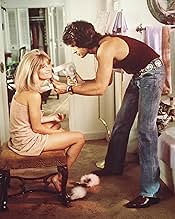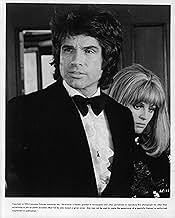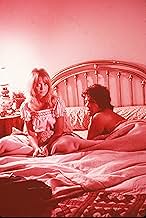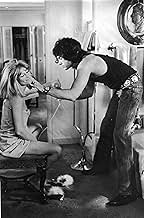Le jour du scrutin de 1968, un coiffeur est trop occupé à couper les cheveux et à s'occuper de ses différentes copines et de sa maîtresse, dont il rencontre et découvre le mari qui a une lia... Tout lireLe jour du scrutin de 1968, un coiffeur est trop occupé à couper les cheveux et à s'occuper de ses différentes copines et de sa maîtresse, dont il rencontre et découvre le mari qui a une liaison avec son ex-blonde.Le jour du scrutin de 1968, un coiffeur est trop occupé à couper les cheveux et à s'occuper de ses différentes copines et de sa maîtresse, dont il rencontre et découvre le mari qui a une liaison avec son ex-blonde.
- A remporté 1 oscar
- 3 victoires et 11 nominations au total
Avis en vedette
Shampoo is a sex comedy in that most, if not all, of its jokes revolve around sex, or at least the implication that sex has taken place or might be about to take place. As a result it is arguable that the comedy is a bit thin and repetitive, and it is true that the story is hardly bursting with riotous wit. And yet ace screenwriter Robert Towne constructs situations that are funny in their believable social awkwardness. They might only raise a chuckle or two over the course of a scene, but they have an almost soap opera quality which keeps us watching. Besides, there's a bit more going on here than bedroom humour. The decision to set it seven years in the past seems strangely arbitrary at first, but it has a surprisingly moving impact when political events start to creep into the narrative, and Warren Beatty's womanising antics are put into some perspective.
Like all comedies, a lot of its success or otherwise depends on the acting performances. This was largely an age of realism in acting, but here the performances are just on the comedic side of real. Nobody does anything which is exactly funny in its own right, but it often is funny in its timing and context. For example, there is Beatty's mumbled excuse to Carrie Fisher (whom he has just had sex with) when he is dragged off by Lee Grant (who intends to have sex with him). Similarly, a lot of Jack Warden's self-important manliness is funny in the context of the fact that Beatty is busy screwing his wife, mistress and teenage daughter. Lee Grant gives another of her typically attention-grabbing minor roles, the authoritative society lady one minute, girlishly sipping a soft drink through a straw the next. Returning to Beatty, I'm also vaguely amused by the way he emphasises the last syllable in "pancreas" during the first scene, as if it's some kind of ass.
The director here is Hal Ashby, a really fine craftsman of 70s cinema with a deceptively simple approach. He doesn't move the camera much, and often keeps back a bit from the action, not in a cold, distant way but more to show everything that is going on in a scene and allow the actors' body language to come across as well as facial expression. This is even effective for the comedy, such as in the scene where Beatty trashes the bin outside the bank, in which the wide shot makes him look somewhat pathetic in his anger. When Ashby does move the camera it is usually to give an impression a setting or situation, often with beautiful economy, and nearly always disguised by following the movement of a character. Take the shot which introduces Jack Warden's home life. He enters from one end of the room, kisses his daughter in mid-shot and surrounded by lots of colour. Then as he crosses what turns out to be a rather large room, the camera wheels round, to reveal his wife sitting alone amid stark white furnishings. An editor before he took up directing, Ashby clearly knows the potentially comedic value of a well-timed crosscut. For example, after the scene in which Warden discusses whether or not Beatty is "a fairy", we cut to a shot of Beatty blow-drying a woman's hair, her face virtually in his crotch.
But there is one thing that makes Shampoo really stand out, and this is something which comes both from Ashby's direction and the Towne/Beatty screenplay: Despite coming from a more liberated era, it still has the artful good taste of the sex comedies of the 30s. It resists the temptation to become soft porn or a string of gross-out jokes. There is only a little partial nudity, and for the most part we do not see much of the sex acts, only their beginnings and aftermaths. And this is an era in which a fairly graphic sex scene was fast becoming a staple of any romantic movie. Despite its being a comedy almost wholly concerned with one man's sexual adventures, Shampoo is a surprisingly mature and refreshingly intelligent motion picture.
Here in the updated "Shampoo", Beatty and Towne make the hero an assumed-to-be-gay hairdresser (instead of impotent)and the results are inspired bedroom farce mixed with social satire.
Younger viewers may find the film a little dated but it was a "period" film when it was made (set in 68 when it was shot in 74) so Ashby consciously gave it that dated look. For me this and Heaven Can Wait are Beatty's best work. Walks a fine comic/tragic line. And this really feels like the closest character to Beatty's heart. It was after this that I went back and saw Splendor in the Grass and began to appreciate Beatty as an actor rather than just a gigolo celebrity.
Great dialogue by Towne, Jack Warden's hilarious and Julie Christie is stunning.
One thing George has consistently wanted to do is open his own hair salon; one day, he turns to Lester and Felicia (Jack Warden and Lee Grant), a wealthy, local-area couple. However, another problem emerges for George and that is the fact that Lester's current mistress (Julie Christie) is one of George's former girlfriends. Lester just outright assumes George, because of his appearance and choice of occupation, is gay, and doesn't see him as any legitimate sexual threat. It isn't until George becomes closer to Lester, meeting his wife, rekindling things with Lester's mistress, and even becoming entranced with select other women that George succumbs to furthering his pedigree as a sexual deviant.
Shampoo subtly evokes the breakdown of the limiting and often sexually regressive sexual politics and standards of the 1960's; it plays similar instruments as Paul Mazursky's brilliant and underrated Bob & Carol & Ted & Alice where the very nature of its plot is subversive because it takes a sensitive, introspective camera into characters' bedrooms rather than simply closing the door on it. It's a period of time in American cinema that I cheekily bill "what I do in the bedroom is all of your business," due to the liberal mindset and furtherance of sexual freedom, orientation, and behavior in public. In the contemporary, sex is still a social taboo in America, but with each year, be it what is accepted by the MPAA, or what is casually discussed by young people in a serious, social setting, the stigma of sex is continuing to be broken in many ways.
Shampoo looks at the social mores by picking a character who is contemptible not because he loves his sex but because of how dishonest he chooses to be. There's nothing wrong with having multiple sexual partners, nor is there nothing inherently wrong with practicing polygamy or sleeping around. There is something wrong, however, with being dishonest or deceptive about it, which is what George consistently is. With that, screenwriters Robert Towne and Beatty seem to recognize this, and Beatty himself seems to recognize it as he's playing the character. Nonetheless, he challenges you to like him largely by the quick-witted and zippy way he moves and conducts himself, as well as the way he works and entertains his clients. He may not be an easy character to like, but he's not an easy character to write off.
With that, Beatty gives an entertaining performance and effective turns an ensemble film into what could easily be mistaken as a one-man show, if it wasn't for the significant presences of Goldie Hawn and Lee Grant, specifically Grant who winds up having some strong scenes with Beatty during more pivotal moments of the film. These inclusions make Shampoo more likable throughout all the contemptible attributes of the film, and the film winds up addressing sexual politics in a way that doesn't tell the audience, but show them. It sort of walks in circles, not always coming to a clear point, but Beatty's performance and its more subtler approach to the material is enough to make it, if nothing else, a thematically and fundamentally interesting piece for the time.
Starring: Warren Beatty, Goldie Hawn, Julie Christie, Jack Warden, and Lee Grant. Directed by: Hal Ashby.
Beatty has never been more charming - or revealing as emptily vain as anyone so "successful" with women can become, and the film switches between surprisingly adult material even for now with a concern for mid-life crises, cultural politics, and ultimately, a cynical view of how the free-wheeling 60s counterculture didn't take themselves seriously enough. Robert Towne's influence in the script is clearly evident.
Already "dated" when it came out, it's a great snapshot of the times, its concerns and issues, and is relevant today.
Le saviez-vous
- AnecdotesLovers off and on since 1967, Warren Beatty and Julie Christie broke up for good during the making of this movie. They remained friends and later worked together in Le ciel peut attendre (1978).
- GaffesThe Coca-Cola can George drinks from while chatting with Lorna is a post-1968 design.
- Citations
George Roundy: Can't we just, eh, be friends?
Lorna: Okay.
[teen-aged Lorna makes George an offer he can't refuse]
Lorna: You wanna fuck?
- Générique farfeluIn the opening credits, horror film producer/actor William Castle is billed as "Bill Castle," but in the end credits he is back to "William Castle."
- ConnexionsFeatured in Precious Images (1986)
- Bandes originalesWouldn't It Be Nice
(1966) (uncredited)
Music by Brian Wilson
Lyrics by Tony Asher, Mike Love and Brian Wilson
Performed by The Beach Boys
Meilleurs choix
- How long is Shampoo?Propulsé par Alexa
Détails
- Date de sortie
- Pays d’origine
- Langue
- Aussi connu sous le nom de
- Sosyete kuaförü
- Lieux de tournage
- 2270 Bowmont Drive, Beverly Hills, Californie, États-Unis(Jackie's House at Bowmont & Hazen)
- sociétés de production
- Consultez plus de crédits d'entreprise sur IMDbPro
Box-office
- Budget
- 4 000 000 $ US (estimation)
- Brut – États-Unis et Canada
- 49 407 734 $ US
- Brut – à l'échelle mondiale
- 49 407 734 $ US
Contribuer à cette page






















